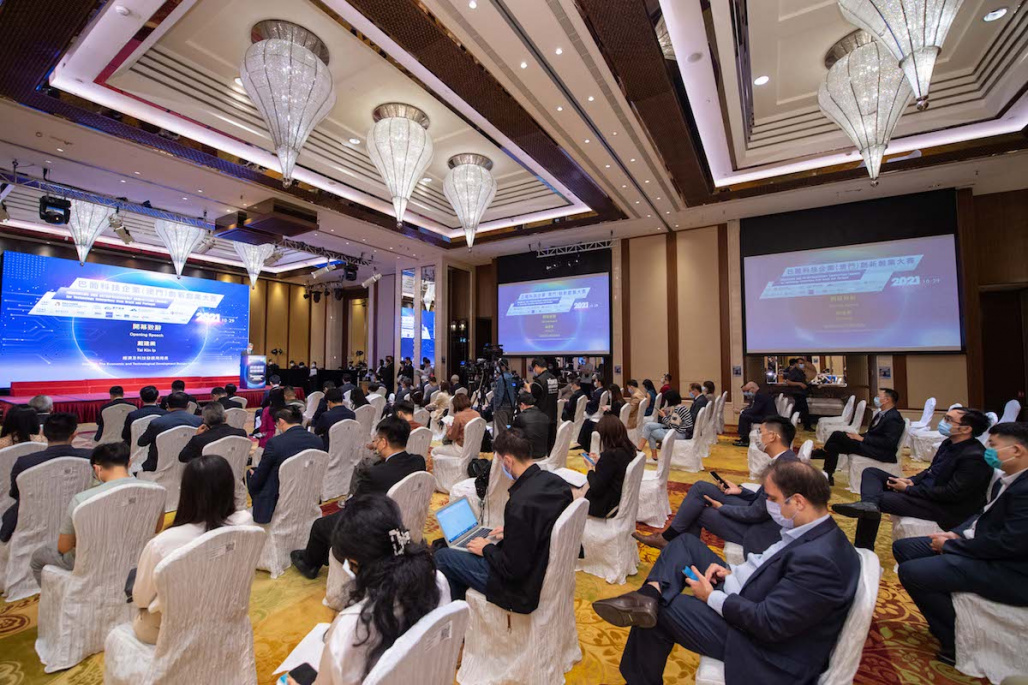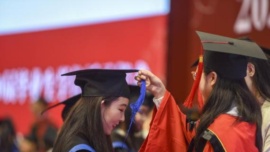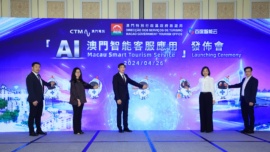Biosolvit, a startup that developed a product to absorb petroleum derivatives on land or at sea, has won the first prize at the inaugural Innovation and Entrepreneurship Competition (Macao) for Technology Enterprises from Brazil and Portugal held yesterday (Friday).
Organised by the Economic and Technological Development Bureau (DSEDT) in cooperation with local public incubator Macao Young Entrepreneur Incubation Centre the competition is another attempt to promote Macau’s role as a platform between China and Portuguese-speaking Countries, this time in the tech innovation arena.
A total of 20 projects were recommended for participation by eight incubators and higher education institutions from Portugal and Brazil, with a 10-minute online roadshow presentation and panel Q&A session were held for each of the projects in the final round of the competition, with part of the event held at the Banyan Tree Hotel.
Most of the enterprises were involved in innovative solutions in areas such as big health, green environmental protection, and artificial intelligence with a judge panel of 10 experts – including investors, financial institutions, researchers, and technology entrepreneurs – selecting the winners of the five main awards.
The Champion went to Biosolvit from Portugal, the First Runner-up NURISE (Portugal) and the Second Runner-up RYAPURTECH (Portugal).
The winners were awarded MOP100,000, MOP80,000, and MOP50,000 respectively as monetary prizes and the corresponding certificates.
On the other hand, BIOO (Brazil) won the “Largest Potential for Development in the Greater Bay Area Award” and Pocket Clinic (Brazil) won the “Largest Potential for Transfer of Technological Value Award”.
The winner of the first prize, biotechnology startup Biosolvit, developed a natural absorber, named Bioblue, which makes use of discarded biomass as raw material to absorb petroleum derivatives on land or at sea, reducing the risk of contamination and waste.
Biosolvit was founded in 2017 in Brazil by Guilhermo Pinheiro de Queiroz, with the objective of carrying out research and development of new materials using vegetable fibres discarded in the production process of canned hearts of palm.
With several awards and new products, the company decided to relocate to Portugal to develop further products, running as a Portuguese startup in this competition which it won with its Bioblue product.
‘Bioblue was born from the market’s need for 100 per cent ecological and sustainable products to solve environmental problems produced by unsustainable companies, thus helping marine life and the environment. The market covered by Bioblue is extremely broad, therefore, it gives us the possibility to offer our products to refineries, steel mills, mining companies, gas stations, among other companies,’ the company indicated.
The product was launched during the Offshore Technology Conference in Houston, US in August and is already on sale on the international market.

One of the competition’s expert judges, Agalai Kong – the CEO and founder of tech group LeapFive – told Macau News Agency that one of the main aspects she was looking for when evaluating the competing enterprises was their contributions to ‘green’ and sustainable development.
“With global warming causing so much rapid change to our environment I was looking for companies who could create better energy sources or leverage current energy sources to help reduce carbon footprint. Also, companies that could help create technologies that could better sustain our environment,” Kong told MNA.
“Other concerns involved technologies that could help improve the health of our ageing populations”
As a former CTO of Google Enterprise Networks and Google Cloud Office, she is very familiar with another worldwide famous ‘Bay Area’ the San Francisco Bay Area, having worked in Silicon Valley for many years.
“One of the nice things of the US Silicon Valley Bay Area scene is that it has the ability to attract talents and funding from all over the world. For our bay area we should repeat the same model and see how to attract global talents that can contribute to us. However, as far as funding goes we have much more of it!” she added.
Several of the participants in this year’s competition had already had the chance to visit the GBA and Hengqin in previous initiatives by SAR authorities, including Luis Monteiro, one of the founders of NU-RISE, a Portuguese startup focused on X-Ray radiation monitoring that grabbed the competition’s second prize.
Founded at the University of Aveiro, NURISE hopes to reduce health risks by helping to control the levels of radiation in radiography.
“We are helping others to apply accurate radiation therapy by providing data in real-time. Meaning we measure the amount of radiation the level is receiving, and using our data to compare it so as to know immediately when there is a deviation and inform doctors,” Monteiro told Macau Business.
“We are in the scaling-up stage, we are close to the market and initiated the regulatory process in the US with the FDA. At the moment we identify three main markets Europe, the US and Asia. Our presence in Macau before was a way to assess how we can approach the market and identify both industrial and clinical partners.
The Portuguese startup has been working with key hospital institutions in Europe to get the necessary clinical data for the regulatory processes and plans the same in the US and plan to do the same in Macau or the GBA.
DSEDT Director, Tai Kin Ip, expressed in his speech during the competition that he hoped the competition would help discover more technology innovation projects from Brazil and Portugal which showed originality and market potential.
“We hope it can also help Macau turn into a bridgehead for their implementation and development in the region and help the enterprises from Brazil and Portugal to gain access to the Chinese mainland market. This way, while promoting technology exchange and cooperation, Macau could also moderately diversify its economic development,” he noted.
According to the DSEDT Director, the purpose would then be in line with the National 14th Five-Year Plan intentions to implement an innovation-driven development strategy and set a clear goal of developing the Greater Bay Area into an international innovation and technology hub.
At the same time the recently established Guangdong-Macao In-depth Cooperation Zone in Hengqin to further provide better resources and broader room for Macau to develop its science and technology industry.
“If the conditions permit we would like to invite the participating teams to come to Macau and the GBA so they directly contact possible investors or partners in the local market. It’s one of the angles were rare aiming for science and technology cooperation between the two sides,” Tai added.






















